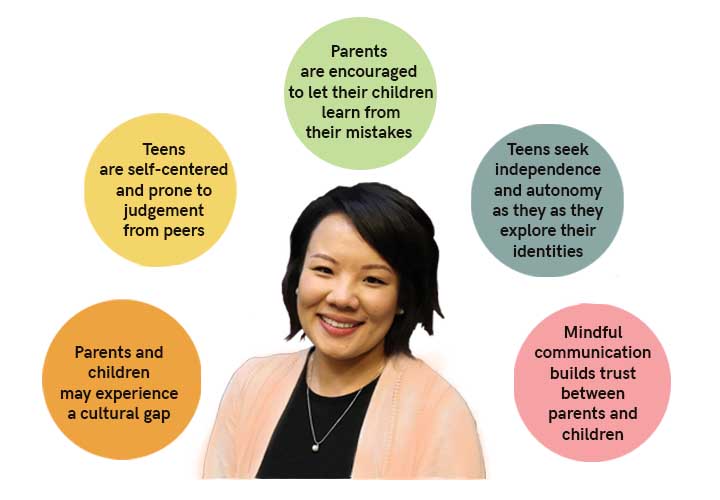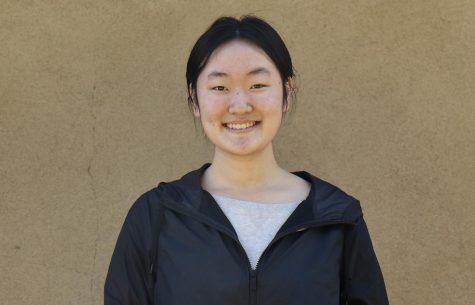PTSA works to improve parent-student communication
Dr. Hanna Chang, a certified psychologist, spoke at a workshop on Oct. 24 offering advice to parents to help them foster better relationships with their children.
November 6, 2019
Dr. Hanna Chang, a Lynbrook Class of 2007 alumna and certified psychologist, spoke at a workshop on Oct. 24 offering advice to parents to help them foster better relationships with their children.
Sameer Mathur, head of the Parent Education Committee on the PTSA, had been searching for ideas for a parent education series.
“The majority of [Lynbrook parents] are first generation Asian immigrants who have grown up in a different environment and perhaps cannot completely relate to their [children’s experience] at Lynbrook,” Mathur said. “So [this workshop] is meant to be a bridge to help them understand different expectations, different dynamics.”
Chang began by informing parents about the adolescent stage of development. Adolescents are more self-focused, which can make them prone to judgement from others. Teens also become more independent as they seek autonomy and control over their own lives.
Chang showed a basic chart outlining the different factors that influence teens, including the education system and family. When such aspects of teenage life conflict, Chang explained, it can create confusion for the teenager. A clash in a second generation student’s life can occur between ethnic traditions and customs at home versus American ones at school, making it more difficult for him or her to navigate their identity.
At Lynbrook, this struggle varies from student to student. For some, the problem is diminished because of the Asian American majority at school and in the community.
“Maybe in different schools, [a student] will be trying to blend in and fit into a more white culture, but there’s a lot more Chinese people here,” said junior Matthew Lu.
For others, finding a balance between heritage and daily life is a larger concern and more difficult to accomplish.
“It’s hard to figure out where you lie on the scale of the American culture and your parents’ culture,” said senior Priyanka Pereira. “The balance for me is being open to learning more and to telling people I don’t know that much but I still want to learn more.”
Chang explained that a cultural gap also forms when parents develop values and social norms differently while raised in another country, which may make relating to their children harder.
The cultural gap, Chang said, only adds to the generational gap between parents and children, which is more universal to all families. Teenagers in this age are especially exposed to a culture that is unfamiliar to their parents, because of the increasingly significant role social media and technology play in lives.
After giving the audience an understanding of their childrens’ viewpoint and the causes of a changing dynamic between parents and their children during adolescence, Chang delved into common parent-child relationship difficulties.
Chang emphasized trust issues that come from children lying to avoid consequences, cover up feelings, or make themselves look better. She drew from her own experiences counseling Asian American teenagers and adults alike to advise parents on how to best handle lying.
“It is far more important to me to build trust and connect with them, and to maintain trust, then it ever will be for me to call them out,” Chang said. “If you’re able to become a safe and non-judgemental person for them, then they’re going to be a lot more comfortable with you, and maybe one day comfortable enough to tell you the truth.”
For creating supportive relationships, Chang believed that parents can help their kids in the decision-making process, but allow the kids to make the final choice and learn from their mistakes. Validating feelings and actively listening are also demonstrations of support and unconditional love that help strengthen parent-children relationships.
“As our lives becomes more fast-paced and busy, finding authentic connections with someone else becomes a lot harder,” Chang said. “If they feel safe with you, they will come to you.”
The talk ended with a thirty-minute Q&A between Chang and the audience. Parents asked for more specific pieces of parenting advice, including where to draw the line on issues, and how to handle certain situations.
Many parents attended the presentation, hoping to learn more about their children’s experiences, and how to better help them. Chang’s talk reinforced themes parents had heard before, such as respecting choices, providing more freedom, and reducing expectations and pressure on their children.
“Generally I know what needs to be done,” said Lynbrook parent John Davies. “But it’s hard to do sometimes.”
Though some of her thoughts have provided familiar ideas to the Lynbrook community, Chang gave some reliable advice for Lynbrook parents to put into practice, and encouraged more understanding connections between Lynbrook students and their parents.



































































